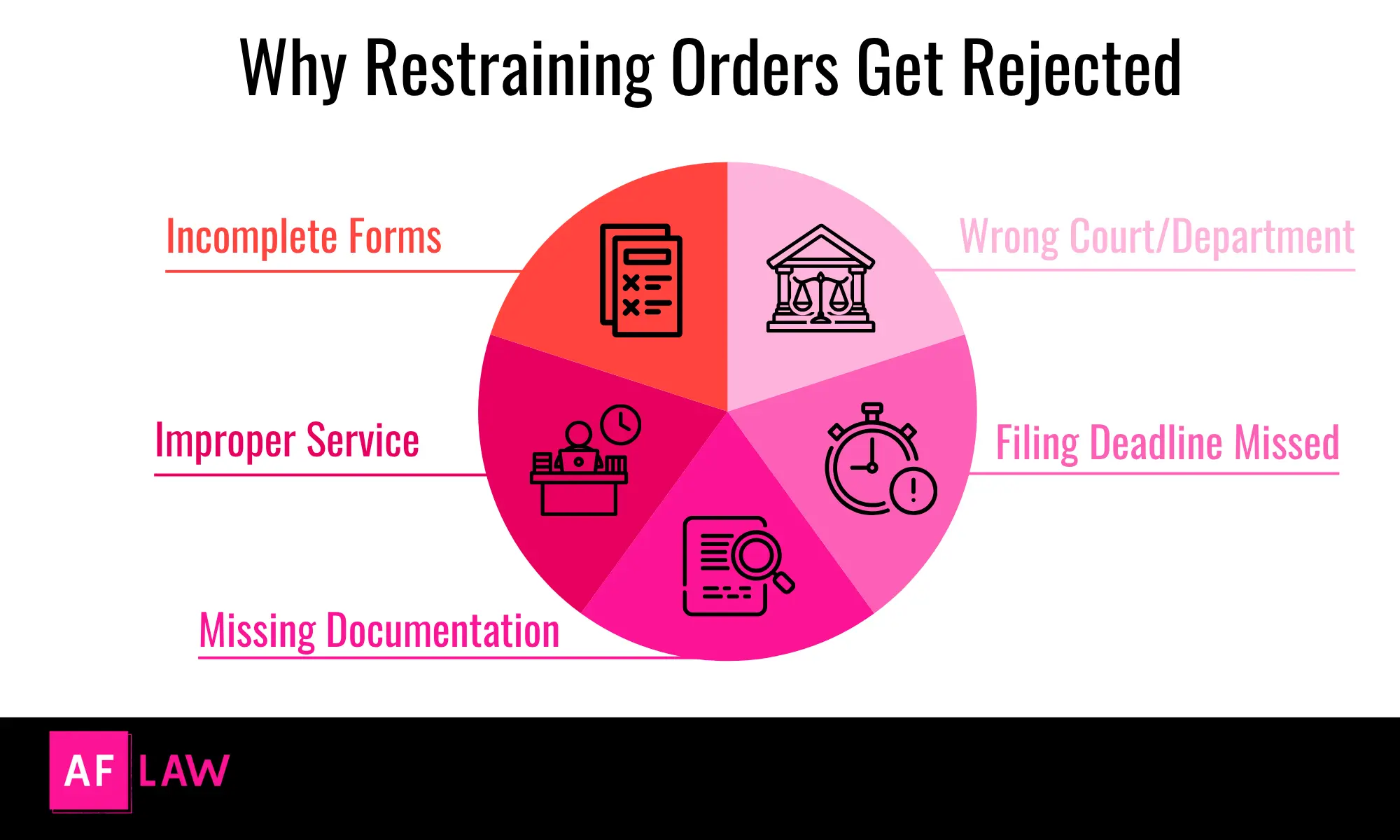California restraining orders expire at different intervals, depending on the order type and the issuing court. Emergency Protective Orders last a maximum of 7 calendar days. Temporary Restraining Orders continue 15 to 25 days until court hearings. Long-term civil orders extend up to 5 years after hearings. Now, a court can issue a postconviction protective order for up to 15 years when a defendant is convicted of violating Penal Code section 273.5(a). This period can be extended to 15 years under Assembly Bill 2308, effective January 1, 2025.
As an experienced Sacramento restraining order attorney, I've seen too many self-represented parties restart the entire process because of simple errors. Court clerks reject improperly completed forms, forcing refilling and extending dangerous waiting periods. This guide outlines the durations of California restraining orders, renewal procedures, and Sacramento County's specific processing timelines, as per current statutes and court rules.
7-Day Emergency Orders: What Police Can Do Tonight
When danger strikes, you don't have time for court appointments. Emergency Protective Orders (EPOs) provide immediate court protection without requiring the victim's action or court appearances. Law enforcement officers contact on-call judges directly when responding to domestic violence, elder abuse, child abuse, or stalking incidents. These orders take effect immediately upon judicial signature, even at 3:00 AM on a Sunday.
California Family Code Section 6250 limits the duration of an EPO to 7 calendar days or 5 business days, whichever ends first. The California Restraining and Protective Order System (CARPOS) receives electronic notification within hours, alerting all law enforcement statewide. Officers serve copies to protected persons at the scene.
Here's what many people don't realize: EPOs cannot be extended or renewed. Protected persons must file for Temporary Restraining Orders before the EPO expiration to maintain protection. Sacramento's Family Law Facilitator's Office, located at 3341 Power Inn Road, assists with TRO applications on weekdays from 8:00 AM to 5:00 PM, providing Judicial Council forms DV-100 through DV-120 for domestic violence cases in Department 129.

Temporary Restraining Orders Last Until Court Hearings
Temporary Restraining Orders bridge the gap between emergency protection and permanent orders. Judges issue TROs based on sworn declarations without requiring the restrained person's presence. This ex parte proceeding under Code of Civil Procedure Section 527.6 means you receive protection first, followed by a court hearing.
TRO duration depends on court calendar availability:
- Minimum: 15 days from issuance
- Typical: 20 to 22 days in Sacramento County
- Maximum: 25 days under California law
The order remains effective until the scheduled hearing date printed on Form DV-109 or CH-109. If proper service fails before the hearing, courts reissue TROs for additional cycles, with some cases spanning months when respondents evade service.
TROs include personal conduct orders prohibiting contact, threats, surveillance, or harassment. Stay-away orders establish minimum distances, typically 100 yards. Residence exclusion orders, temporary child custody arrangements, visitation orders, and property use determinations take immediate effect. Violations constitute misdemeanors under Penal Code Section 273.6, punishable by up to one year in county jail and a fine of up to $1,000. Second violations within seven years involving physical injury become felonies, carrying state prison sentences of up to 4 years.
"Permanent" Orders Aren't Permanent: 5-Year Facts
Let me clear up the biggest misconception: "Permanent restraining orders" aren't actually permanent. These orders expire after court-specified durations, typically 3 to 5 years. California law establishes different maximum durations for each category of restraining order, and understanding these differences is crucial for your protection strategy.
Domestic Violence Restraining Orders
Family Code Section 6345 authorizes DVROs up to 5 years following notice hearings.
Sacramento judges issue orders based on these factors:
- Severity and frequency of past abuse
- Criminal history involving violence
- Violations of prior restraining orders
- Ongoing proximity between parties
- Presence of minor children
DVROs apply when specific relationships exist. Current or former spouses, dating partners, parents of common children, blood relatives, and current or former cohabitants all qualify. The relationship defines the remedy.
Beyond keeping someone away, DVROs determine your entire family structure. Child custody and visitation schedules, child support calculations using statewide guidelines, spousal support arrangements pending divorce, exclusive use of property, pet custody, and debt payment responsibilities are all determined in one hearing.
The preponderance of evidence standard applies, meaning you need to prove abuse is more likely than not to have occurred. Sacramento judges accept police reports, medical records, photographs of injuries or damage, threatening messages, witness declarations, and 911 recordings as evidence. Gather everything.

Civil Harassment Restraining Orders
Civil Harassment Restraining Orders protect against abuse from non-intimate relationships, including neighbors, coworkers, roommates, and strangers. Code of Civil Procedure Section 527.6 authorizes CHROs to remain in effect for up to 5 years after a hearing.
CHROs require clear and convincing evidence, a higher burden than DVROs.
Harassment must include:
- Unlawful violence or credible threats of violence, or
- A knowing and willful course of conduct directed at a specific person that seriously alarms, annoys, or harasses them and serves no legitimate purpose
Single incidents rarely meet the legal standard unless they involve actual violence or explicit death threats. Sacramento judges reject CHROs for ordinary disputes, requiring documented patterns of escalating behavior.
AB 2308 Changed Everything: 15-Year Protection Now
Assembly Bill 2308 extended the maximum term of a criminal protective order from 10 to 15 years, effective January 1, 2025. This change addresses gaps where orders expired during incarceration periods, leaving victims unprotected upon offender release.
Criminal protective orders differ fundamentally from civil restraining orders:
- Issuing authority: Criminal court judges issue CPOs during criminal proceedings. Civil court judges issue DVROs and CHROs through family or civil departments.
- Initiation process: Prosecutors request CPOs without victim involvement. Victims must personally petition for civil orders.
- Duration triggers: CPOs remain in effect throughout the duration of the criminal case or specified post-conviction periods. Civil orders require separate expiration dates.
- Violation consequences: CPO violations trigger new felony charges with mandatory minimum sentences. Civil order violations may result in contempt proceedings or misdemeanor charges.
The 15-year maximum applies to specific domestic violence convictions, including corporal injury to spouse (PC 273.5), protective order violations (PC 273.6), domestic battery (PC 243(e)(1)), and stalking (PC 646.9).
Sacramento District Attorney's Office favors maximum duration requests in felony cases involving great bodily injury, prior convictions, multiple victims, including children, and weapons use.

Special Circumstances Require Special Orders
Standard restraining orders can't cover every threat. California recognizes this reality through specialized orders that target specific contexts. Each carries unique durations, evidence standards, and enforcement mechanisms.
#spoilers_start
Workplace Violence Restraining Orders: 3-Year Maximum
Labor Code Section 527.8 lets employers protect employees from workplace violence. Orders are valid for up to 3 years after the hearing. Senate Bill 428, effective January 2025, expanded coverage to include harassment causing substantial emotional distress without requiring violence or explicit threats.
Employers must demonstrate:
- Unlawful violence or credible threats affecting employees at worksites
- Reasonable belief that future violence may occur
- Conduct not part of legitimate labor disputes
Gun Violence Restraining Orders: Variable Terms
Penal Code Section 18150 establishes GVRO durations:
- Emergency GVROs: 21 days maximum
- Temporary GVROs: Until hearing date (21 days)
- GVROs after hearing: 1 to 5 years
Law enforcement, family members, employers, coworkers, teachers, and mental health workers may petition for GVROs. Orders prohibit the possession, purchase, or receipt of firearms and ammunition.
Elder Abuse Restraining Orders: 5-Year Maximum

Welfare and Institutions Code Section 15657.03 protects persons 65 or older and dependent adults 18 to 64 with physical or mental limitations. Orders match DVRO durations, with a maximum of 5 years. Financial abuse provisions prevent access to a victim’s assets and accounts.
School Violence Prevention Orders: 3-Year Maximum
Code of Civil Procedure Section 527.85 allows courts to issue orders protecting students from credible threats of violence. These protections can last up to 3 years and apply across all school campuses and activities.
#spoilers_end
Quick Reference: How Long Each Order Protects You
Making sense of restraining order timelines shouldn't require a law degree. This chart breaks down exactly what to expect:
Renewal Procedures: Extending Protection Without New Incidents
Family Code Section 6345(a) permits restraining order renewals "without a showing of any further abuse since the issuance of the original order". This provision acknowledges that a lack of violations may result from the order's effectiveness rather than a change in behavior.
Renewal requirements include:
- Filing Form DV-700 (domestic violence) or CH-700 (civil harassment) before the current order's expiration.
- Serving notice on a restrained person at least 16 court days before the hearing.
- Appearing at the scheduled renewal hearing.
Sacramento Superior Court reviews whether there were violations, the protected person’s continued fear, safety concerns, proximity, and past violence. Renewals are typically granted for an additional 5 years, although in rare cases, they may be permanent or modified with fewer restrictions.
What Sacramento Attorneys Actually Charge for Orders
Restraining order attorneys in California, such as those in Sacramento, charge between $200 and $500 per hour. Most bill $300 to $350 per hour. Total costs range from $1,500 for straightforward TRO hearings to $7,500 for contested permanent order hearings involving custody disputes. Flat-fee arrangements typically cost between $2,500 and $5,000 for complete representation through a permanent order hearing.
Your attorney delivers more than paperwork. We gather admissible evidence, prepare witness examinations, object to improper testimony, negotiate stipulated agreements when possible, and present legal arguments tailored to specific judges' preferences. Sacramento attorneys who are familiar with local judges understand which arguments are most likely to resonate in specific departments. That knowledge wins cases.
Critical Deadlines That Determine Your Protection

The effectiveness of a restraining order depends on meeting strict legal deadlines. Missing any deadline eliminates protection or restarts the entire process.
Your protection timeline:
- Within 24 hours of the incident: Request EPO through law enforcement.
- Before EPO expires (day 5-7): File TRO application.
- Within 5 days of TRO issuance: Complete personal service on the respondent.
- At least 5 days before hearing: File proof of service with the court.
- Before the current order expires: File renewal request (recommend 30 days advance).
- After order issuance: Request certified copies for law enforcement agencies.
Your Safety Can't Wait: Schedule Your Consultation
Restraining order durations vary from 7-day emergency orders to 15-year criminal protective orders, but every case requires immediate strategic action. I handle restraining order matters throughout Sacramento, Yolo, and Placer counties with the precision these time-sensitive cases demand.
Procedural errors can cost you valuable protection time that you cannot afford to lose. Don't navigate this alone. AF Law stands ready to protect you. Contact me today at (916) 434-1600.


%205.avif)



